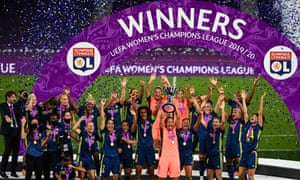In December 2019, Uefa announced a shake up of the Women’s Champions League for the 2021-22 season. There was to be a group stage and an increase in the number of teams taking part, partly through the six highest-ranked nations being awarded a third place in the competition.
The changes were welcome, especially among England’s big three of Arsenal, Chelsea and Manchester City as it meant they would no longer have to battle for two coveted spots each year. Instead it would be a case of holding off the rest.
The dominance of the big three was evident last season – Chelsea finished as champions, City were runners-up and Arsenal third, all on a points-per-game basis after the pandemic ended the campaign prematurely. There were no serious challengers to the triumvirate for a sixth season in a row – including during the mini Spring Series, which filled the gap as the league switched from a summer to a winter season. Manchester United finished fourth, which was impressive given this was their debut appearance in the WSL but they still finished 13 points behind Arsenal, albeit having played one game fewer.
So the battle for Champions League qualification this season was expected to be more a sharing of the spoils than a fight, with Chelsea, City and Arsenal taking the now three available spots, with the top two teams going directly into the second round and the one finishing third starting off in the first round. This is one of the reasons why United’s explosive start to their second WSL season – they lead the way with 26 points from 10 unbeaten games – should be welcomed, ensuring as it does that reaching the Champions League is a genuine ambition rather than an assumption.
From a financial point of view, it is also an increasingly important competition to be in. The prize money is dwarfed by that dished out in the men’s Champions League but the winners of the women’s edition nevertheless collect a tidy sum – around €500,000 – which is also likely to rise when broadcast rights are centralised as part of Uefa’s reformat.
The Women’s Champions League is a bigger deal every year, more commercially viable and with more eyes on it. Visa, Nike, Hublot, Esprit and PepsiCo all sponsor the tournament in its own right, with backing for the women’s competition having split from the men’s in 2018. What the tournament now needs is a new winner. Lyon lifted the trophy for the fifth consecutive time in August and for a record seventh time overall. Their domination of Europe has been earned, fuelled by unrivalled investment and the building of a galáctico-style squad being paid the best wages in the women’s game.

Lyon have set the bar high but they keep pushing it higher, almost daring clubs to try catching them. An English side has not won the competition since Arsenal’s victory in 2007, with Chelsea and City twice falling at the semi-final stage – Lyon knocked the Manchester side out in both 2016-17 and 2017-18.
As the WSL gets increasingly competitive, it also becomes harder to compete across multiple competitions, making a challenge to Lyon’s crown from an English club all the harder. It is increasingly difficult, then, to see United giving up a maiden Champions League berth. That means, despite the rise to three qualifying places, one of Arsenal, City or Chelsea are likely to miss out, which is not only costly for the reasons above – with many players on short-term contracts, key players could jump ship in search of a more immediate European test.
With the worst head-to-head record with the rest of the top four, Arsenal are perhaps at greatest risk of slipping out. However, the team’s consistency against the rest is better than their rivals, making it impossible at this stage to predict who will gain entry into the revamped tournament.
What is certain, though, is that the team missing out will have a bigger job getting back into Champions League contention than perhaps any team has before.
from Football | The Guardian https://ift.tt/3rLq1oY
via IFTTT

No Comment